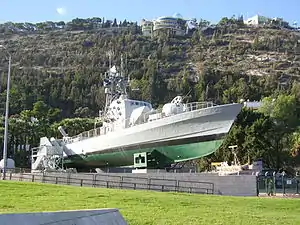Sa'ar 2-class missile boat
The Sa'ar 2 class ("Shalechet") is a class of missile boats built in Cherbourg, France at the Constructions Mécaniques de Normandie shipyard based on Israeli Navy modification of the German Navy's Jaguar-class fast attack craft. Three of the ships class were converted from Sa'ar 1-class patrol boats in 1974.
 INS Mivtach on display at the Clandestine Immigration and Naval Museum, Haifa | |
| Class overview | |
|---|---|
| Name: | Sa'ar 2 class |
| Builders: | Constructions Mécaniques de Normandie |
| Operators: |
|
| Preceded by: | Sa'ar 1 class |
| Succeeded by: | Sa'ar 3 class |
| In commission: | 1967-1997 |
| Completed: | 6 |
| General characteristics | |
| Type: | Missile boat |
| Displacement: | 220 tons (250 tons loaded) |
| Length: | 45 m (148 ft) |
| Beam: | 7.62 m (25.0 ft) |
| Draft: | 1.8 m (5.9 ft) |
| Propulsion: | 4 MTU 16V 538 diesel engines, four shafts, total of 12,800 hp (9,500 kW) |
| Speed: | 40 knots (74 km/h; 46 mph) |
| Range: |
2,500 nmi (4,600 km; 2,900 mi) at 15 kn (28 km/h; 17 mph) 1,000 nmi (1,900 km; 1,200 mi) at 30 kn (56 km/h; 35 mph) |
| Complement: | 40 |
| Sensors and processing systems: |
|
| Armament: |
|
Design and development
The Israeli naval command had reached the conclusion by the early 1960s that their old Second World War-era destroyers, frigates and corvettes were obsolete and new ships and vessels were needed.[4] Yitzhak Shoshan, later to command the destroyer INS Eilat at the time of her sinking, surveyed the available torpedo boat designs and recommended the German Jaguar class.[5] The Israeli Navy asked Lürssen, the shipyard which built the Jaguar class, to modify the wooden design by switching to steel construction, adding 2.4 metres (7.9 ft) to the length, and revising the internal compartmentalization.[6] Due to Arab League pressure on the German government, this plan was not continued and a new builder was sought.[7] The Israeli Navy discovered that the Cherbourg-based Constructions Mécaniques de Normandie shipyard owned by Félix Amiot had experience building patrol boats in cooperation with Lürssen and would build the boats, based upon the German designs and plans.[8] The engines were imported from Germany.[9] The project received the codename "Falling Leaves" (Hebrew: שלכת).[10]
An initial group of six boats was ordered in 1965, with an armament of Bofors 40 mm guns and torpedo tubes and provision for fitting sonar. This group was designated the Sa'ar 1 class. When refitted with Gabriel anti-ship missiles, they became the Sa'ar 2 class. A second group of six boats, the Sa'ar 3 class, was ordered in 1968, with an OTO Melara 76 mm gun instead of the Bofors guns of the Sa'ar 1 class and with anti-submarine provisions omitted.[11]
Description
The boats were long, slender vessels. They measured 44.9 metres (147 ft 4 in) in length, with a beam of 7.62 metres (25 ft 0 in) and a draft of 1.7 metres (5 ft 7 in). Displacement is 220 long tons (220 t) standard and 250 long tons (250 t) full load. The boats were powered by four MTU 16V 538 diesel engines giving a total power of 13,500 bhp (10,100 kW) and driving four propeller shafts. This gave a maximum speed of 42 knots (78 km/h; 48 mph). Range was 2,500 nmi (4,600 km; 2,900 mi) at 15 kn (28 km/h; 17 mph) or 1,000 nautical miles (1,900 km; 1,200 mi) at 30 knots (56 km/h; 35 mph).[11]
The vessels in the class come in two versions of armament. One version is equipped with five to eight Gabriel II surface-to-surface missiles (SSM), one Bofors L/70 40 mm gun, two 0.30 in (7.62 mm) caliber M1919A4 Browning machine guns and four 7.62 mm FN MAG 58 general-purpose machine guns.
The other version is equipped with four RGM-84 Harpoon SSMs and two Gabriel II SSMs.
Boats in the class
| Sa'ar 2 class[12] | |||||
| Number | Name | Translation | Builder | Launched | Fate |
|---|---|---|---|---|---|
| 311 | INS Mivtach | Reliance | Constructions Mécaniques de Normandie | 11 April 1967 | Retired 1994[13] |
| 312 | INS Miznak | Jet branch | 1967 | Retired 1994[13] | |
| 313 | INS Misgav | Stronghold | 1967 | Retired 1994[13] | |
| 321 | INS Eilat | Eilat | 14 June 1968 | Retired 1994[13] | |
| 322 | INS Haifa | Haifa | 14 June 1968 | ||
| 323 | INS Akko | Akko | 1968 | ||
See also
References
Citations
- Friedman, 1989. p. 230.
- Friedman 1997. p. 304.
- Friedman 1997. p. 628.
- Rabinovich, pp. 23-27
- Rabinovich, p. 35
- Rabinovich, pp. 47-48
- Rabinovich, p. 61
- Rabinovich, pp. 62-63
- Rabinovich, p. 18
- Rabinovich, p. 56
- Gardiner and Chumbley, pp. 192–193.
- Gardiner and Chumbley, p. 193
- Baker 1998, p. 367.
Sources
- Baker III, A.D. (1998). The Naval Institute Guide to Combat Fleets of the World 1998–1999. Annapolis, Maryland, USA: Naval Institute Press. ISBN 1-55750-111-4.
- Friedman, Norman (1997). The Naval Institute Guide to World Naval Weapons Systems, 1997-1998. Annapolis, Maryland: Naval Institute Press. ISBN 1-55750-268-4.
- Friedman, Norman (1989). The Naval Institute Guide to World Naval Weapon Systems. Annapolis, Maryland: Naval Institute Press. ISBN 1-55750-262-5.
- Gardiner, Robert; Chumbley, Stephen; Budzbon, Przemysław, eds. (1995). Conway's All the World's Fighting Ships, 1947-1995. Annapolis, Maryland: Naval Institute Press. ISBN 1-55750-132-7.
- Rabinovich, Abraham (1988). The Boats of Cherbourg. New York, New York: Henry Holt and Co. ISBN 0-8050-0680-X.